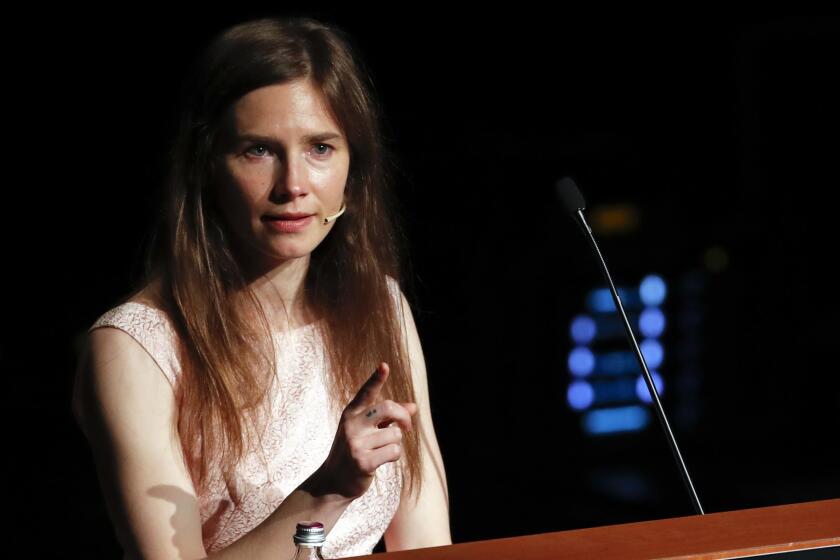Abigail McCarthy; Writer Aided Husband’s Political Career
- Share via
Abigail Quigley McCarthy, the wife of Sen. Eugene J. McCarthy (D-Minn.) who established an influential career as a writer and commentator in the wake of her husband’s failed presidential bid in 1968, has died.
McCarthy died Thursday at her home in Washington, D.C. She was 85, and the cause of death was breast cancer, which she had been fighting since the mid-1980s.
Although McCarthy and her husband, both devout Catholics, separated after the 1968 campaign, they never divorced. But the failure of her marriage fueled her successes as a writer and commentator.
She was a longtime columnist for Commonweal magazine, tackling a variety of sometimes controversial subjects, as well as a novelist, memoirist and book reviewer.
Her memoir, “Private Faces/Public Places,” reflecting on her 20 years as a political wife, was hailed by critics, including one in the New Yorker, who called the book “simply and beautifully written.”
She wrote two Washington-based novels: “Circles,” which dealt with a senator’s efforts to win the presidency, and “One Woman Lost,” written with Jane Muskie, wife of Sen. Edmund S. Muskie, who won the Democratic vice presidential nomination in 1968. “One Woman Lost,” published in 1986, is a story of drugs, the mob, murder and politics in the nation’s capital. Much of her writing in the book was done while undergoing a mastectomy and chemotherapy.
By all accounts, Abigail McCarthy immersed herself in the role of political wife, bringing to it dedication and organizing ability, as well as a rueful recognition of its restrictions.
Her political life began more than 50 years ago, after an early period of teaching and writing. She proved adept on the stump and in campaign planning when her husband ran successfully for the House of Representatives in 1948.
A Consummate Political Wife
But her very success also made some politicians nervous.
Eugene McCarthy once recalled a debate between the wives during the 1948 campaign. “It was bad,” he said. “My opponent’s wife broke down in tears. It was sort of like mud wrestling before it was over. . . . I finally said to Abigail, ‘No more debates.’ ”
After the McCarthys came to Washington, she raised their children and became active in the campaigns for civil rights and women’s rights. She was also prominent in the ecumenical movement.
She was a member of the board of the National Conference for Interracial Justice and the advisory board of the Women’s Equity Action League. She was founding president of the Clearing House on Women’s Issues.
In the 1968 campaign, when Eugene McCarthy challenged President Lyndon B. Johnson and Johnson’s Vietnam policy, Abigail McCarthy was said to have played a key strategy role.
But the rigorous campaign, which put her in the hospital three times for exhaustion, also took a toll on the marriage. Less than a year after the election, Eugene McCarthy left his wife. “I have never been sure in my own mind whether it was the strain of political life or the very particular strains of the 1968 campaign, or just the 1960s,” she later said of the failure of their marriage.
“I really probably think all those things entered into it. Although I would never undo 1968. I believed in it as much as Gene did,” she added.
The daughter of the publisher of a local newspaper, Abigail Quigley was born in Wabsha, Minn. After graduating from the College of St. Catherine, she began teaching at a high school in Mandan, N.D. But she went on to earn a master’s degree from the University of Minnesota and later taught at the College of St. Catherine.
In 1945 she married a young teacher she had met while teaching in Mandan--Eugene McCarthy.
In her column in Commonweal, which she wrote for 25 years, ending in 1999, she expressed an active interest in the affairs of the Catholic Church. Among other things, she was described as an advocate of increased participation by lay people in shaping church teaching, and was concerned with correcting what she viewed to be unjust treatment of women inside and outside the church.
She wrote biographical studies of Eleanor Roosevelt, Jane Grey Swisshelm and Saint Teresa of Avila.
After she and her husband separated, Washington remained her home. In time, she said, she adopted this philosophy about the city: “You come. You go. You’re up. You’re down. But it’s always an interesting show.”
A daughter, Mary Abigail McCarthy, died in 1990 of pancreatic cancer.
In addition to her husband, who lives in Woodville, Va., survivors include three other children, Ellen of Washington, Michael of Seattle and Margaret of Beirut; a brother; and six grandchildren.
More to Read
Sign up for our Book Club newsletter
Get the latest news, events and more from the Los Angeles Times Book Club, and help us get L.A. reading and talking.
You may occasionally receive promotional content from the Los Angeles Times.










